Challenges and Benefits of Technology in UK Public Sector: NAO Study
VerifiedAdded on 2022/12/14
|11
|2886
|115
Report
AI Summary
This research report investigates the challenges and benefits of technology in shaping public sector perceptions within the UK, using the National Audit Office (NAO) as a case study. The study begins with an introduction outlining the background, aim, objectives, research questions, and rationale for the research. A literature review explores existing research on technology's role in the public sector and its impact on perceptions. The methodology section details the research type (qualitative), approach (inductive), philosophy (interpretivism), data collection methods (primary), sampling strategy (random), and data analysis techniques (thematic analysis). Ethical considerations, reliability, validity, and limitations are also discussed. The report's findings aim to identify the concept of technological upgradation, changing perceptions in relation to technology, challenges and benefits, and ways to effectively handle these changing perceptions. The research concludes by summarizing the impact of technology on public sector organizations, emphasizing the need for effective management of the changing perceptions. The report also includes an appendix with an ethical issues form.
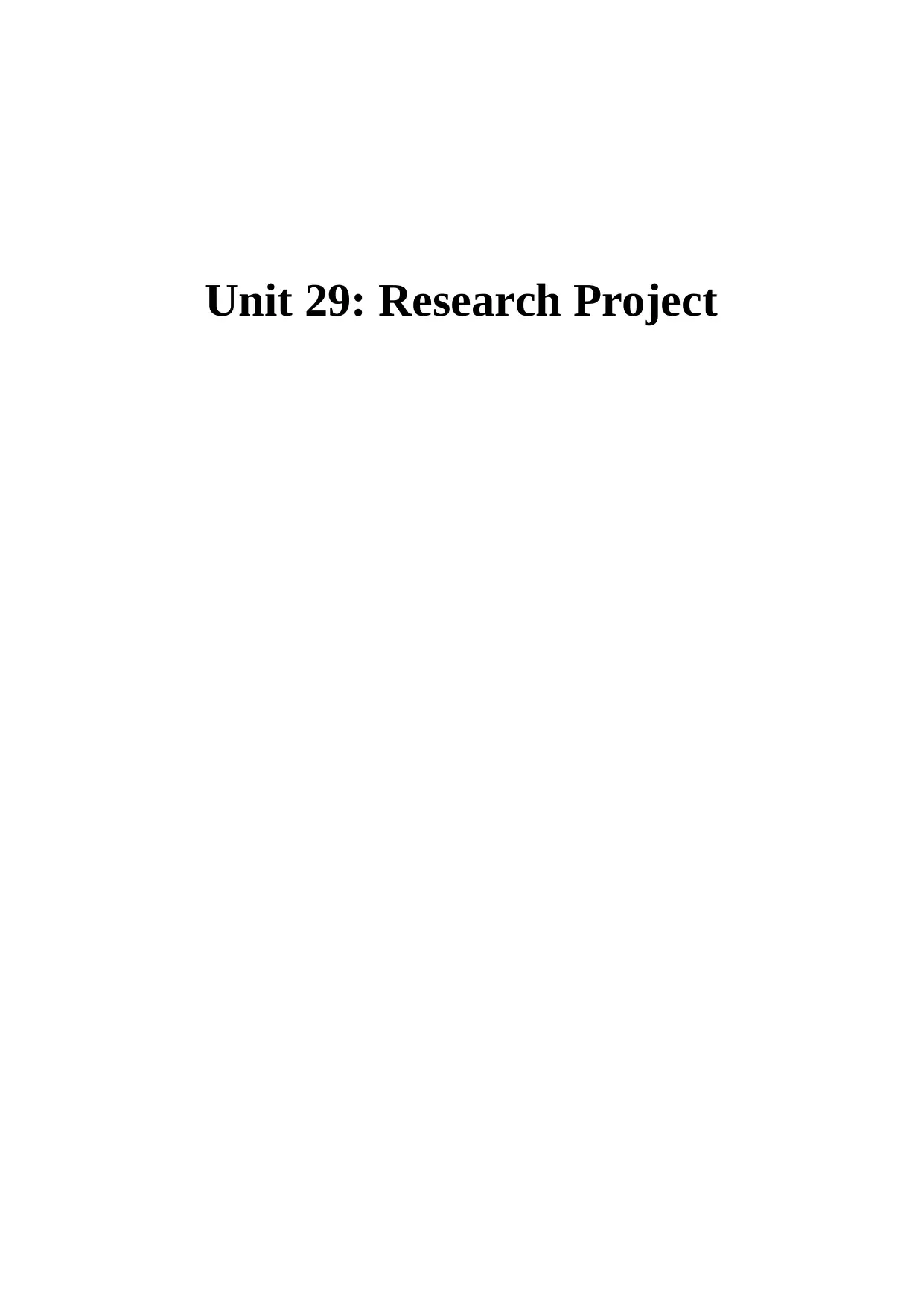
Unit 29: Research Project
Paraphrase This Document
Need a fresh take? Get an instant paraphrase of this document with our AI Paraphraser
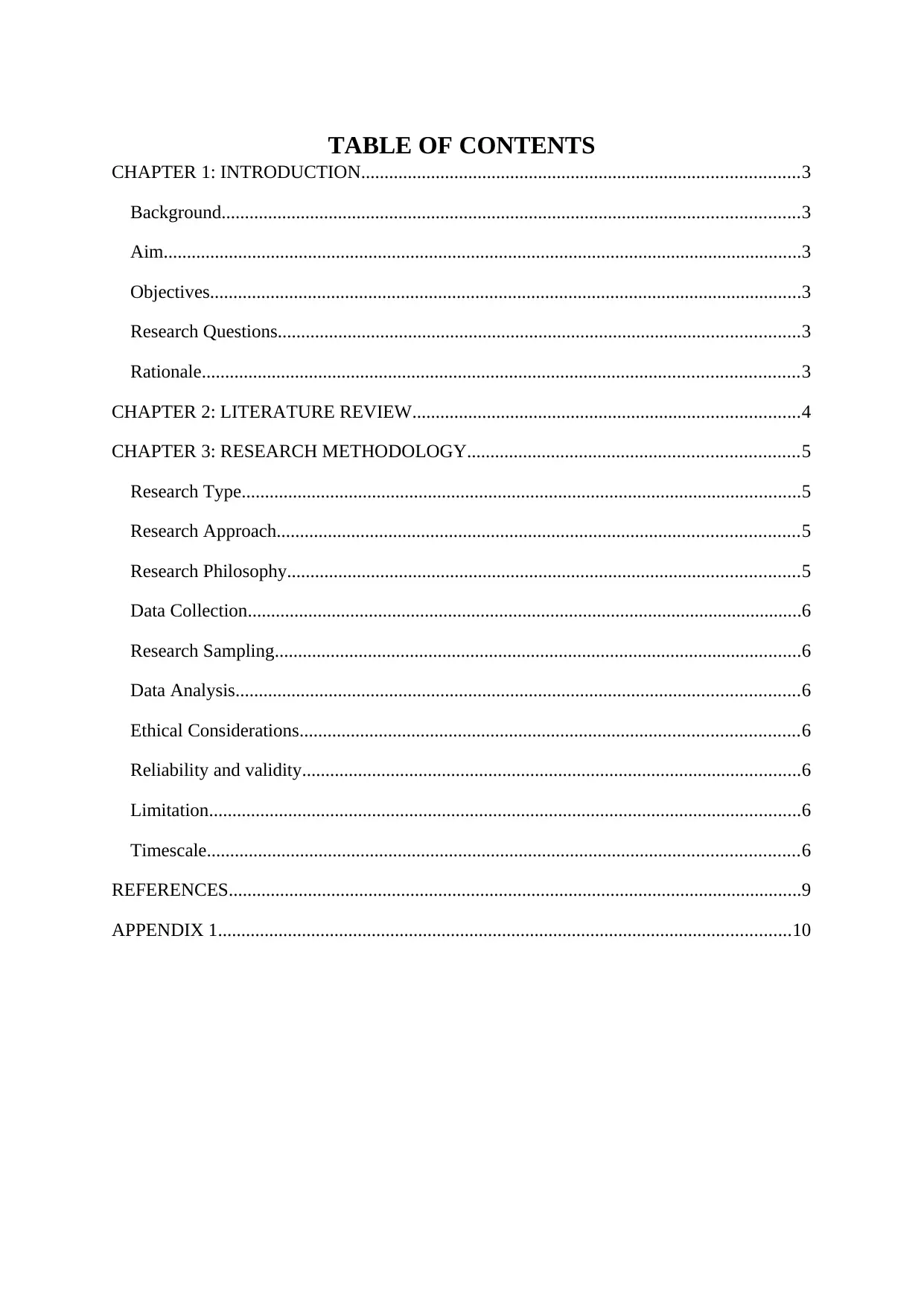
TABLE OF CONTENTS
CHAPTER 1: INTRODUCTION..............................................................................................3
Background............................................................................................................................3
Aim.........................................................................................................................................3
Objectives...............................................................................................................................3
Research Questions................................................................................................................3
Rationale................................................................................................................................3
CHAPTER 2: LITERATURE REVIEW...................................................................................4
CHAPTER 3: RESEARCH METHODOLOGY.......................................................................5
Research Type........................................................................................................................5
Research Approach................................................................................................................5
Research Philosophy..............................................................................................................5
Data Collection.......................................................................................................................6
Research Sampling.................................................................................................................6
Data Analysis.........................................................................................................................6
Ethical Considerations...........................................................................................................6
Reliability and validity...........................................................................................................6
Limitation...............................................................................................................................6
Timescale...............................................................................................................................6
REFERENCES...........................................................................................................................9
APPENDIX 1...........................................................................................................................10
CHAPTER 1: INTRODUCTION..............................................................................................3
Background............................................................................................................................3
Aim.........................................................................................................................................3
Objectives...............................................................................................................................3
Research Questions................................................................................................................3
Rationale................................................................................................................................3
CHAPTER 2: LITERATURE REVIEW...................................................................................4
CHAPTER 3: RESEARCH METHODOLOGY.......................................................................5
Research Type........................................................................................................................5
Research Approach................................................................................................................5
Research Philosophy..............................................................................................................5
Data Collection.......................................................................................................................6
Research Sampling.................................................................................................................6
Data Analysis.........................................................................................................................6
Ethical Considerations...........................................................................................................6
Reliability and validity...........................................................................................................6
Limitation...............................................................................................................................6
Timescale...............................................................................................................................6
REFERENCES...........................................................................................................................9
APPENDIX 1...........................................................................................................................10
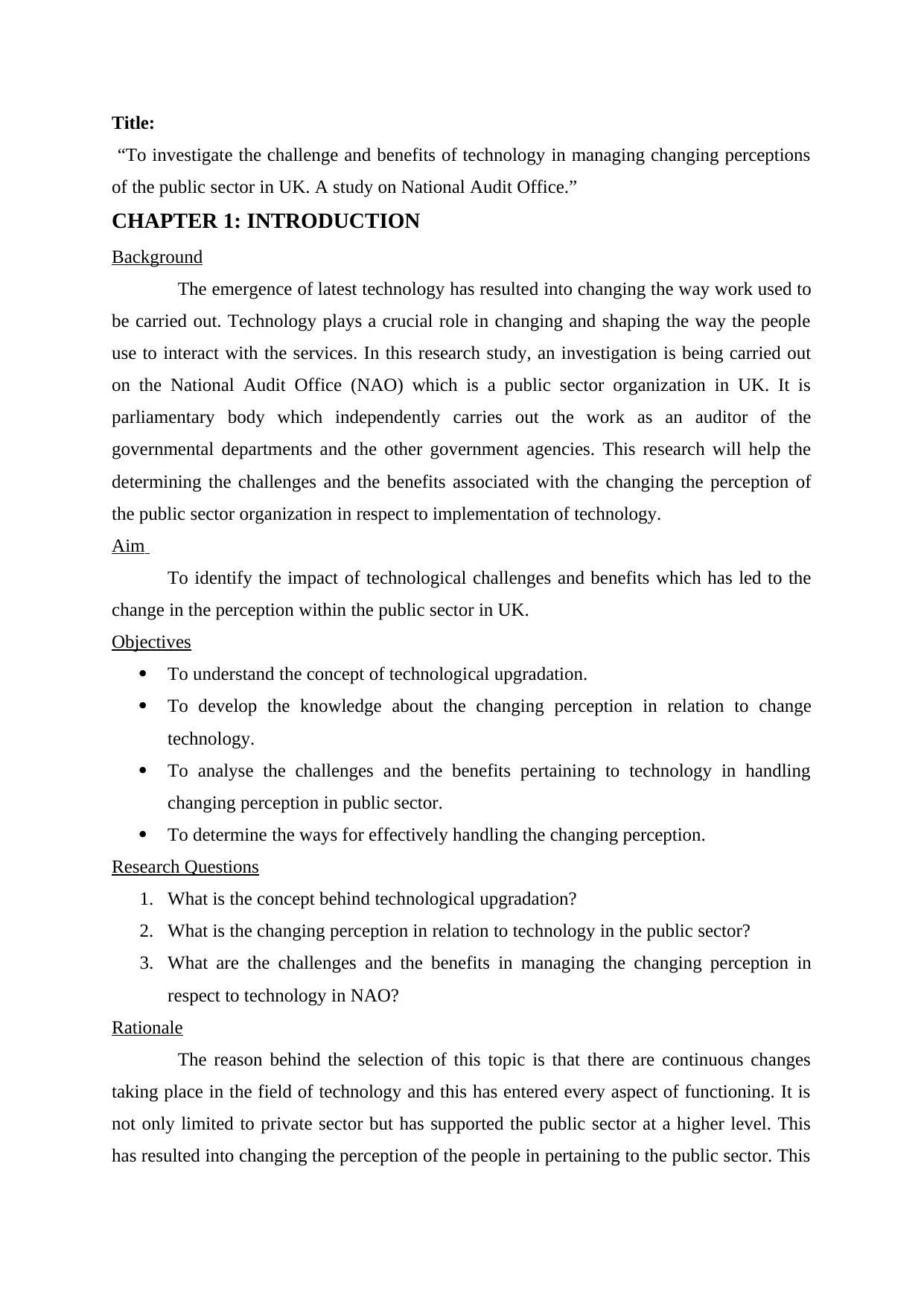
Title:
“To investigate the challenge and benefits of technology in managing changing perceptions
of the public sector in UK. A study on National Audit Office.”
CHAPTER 1: INTRODUCTION
Background
The emergence of latest technology has resulted into changing the way work used to
be carried out. Technology plays a crucial role in changing and shaping the way the people
use to interact with the services. In this research study, an investigation is being carried out
on the National Audit Office (NAO) which is a public sector organization in UK. It is
parliamentary body which independently carries out the work as an auditor of the
governmental departments and the other government agencies. This research will help the
determining the challenges and the benefits associated with the changing the perception of
the public sector organization in respect to implementation of technology.
Aim
To identify the impact of technological challenges and benefits which has led to the
change in the perception within the public sector in UK.
Objectives
To understand the concept of technological upgradation.
To develop the knowledge about the changing perception in relation to change
technology.
To analyse the challenges and the benefits pertaining to technology in handling
changing perception in public sector.
To determine the ways for effectively handling the changing perception.
Research Questions
1. What is the concept behind technological upgradation?
2. What is the changing perception in relation to technology in the public sector?
3. What are the challenges and the benefits in managing the changing perception in
respect to technology in NAO?
Rationale
The reason behind the selection of this topic is that there are continuous changes
taking place in the field of technology and this has entered every aspect of functioning. It is
not only limited to private sector but has supported the public sector at a higher level. This
has resulted into changing the perception of the people in pertaining to the public sector. This
“To investigate the challenge and benefits of technology in managing changing perceptions
of the public sector in UK. A study on National Audit Office.”
CHAPTER 1: INTRODUCTION
Background
The emergence of latest technology has resulted into changing the way work used to
be carried out. Technology plays a crucial role in changing and shaping the way the people
use to interact with the services. In this research study, an investigation is being carried out
on the National Audit Office (NAO) which is a public sector organization in UK. It is
parliamentary body which independently carries out the work as an auditor of the
governmental departments and the other government agencies. This research will help the
determining the challenges and the benefits associated with the changing the perception of
the public sector organization in respect to implementation of technology.
Aim
To identify the impact of technological challenges and benefits which has led to the
change in the perception within the public sector in UK.
Objectives
To understand the concept of technological upgradation.
To develop the knowledge about the changing perception in relation to change
technology.
To analyse the challenges and the benefits pertaining to technology in handling
changing perception in public sector.
To determine the ways for effectively handling the changing perception.
Research Questions
1. What is the concept behind technological upgradation?
2. What is the changing perception in relation to technology in the public sector?
3. What are the challenges and the benefits in managing the changing perception in
respect to technology in NAO?
Rationale
The reason behind the selection of this topic is that there are continuous changes
taking place in the field of technology and this has entered every aspect of functioning. It is
not only limited to private sector but has supported the public sector at a higher level. This
has resulted into changing the perception of the people in pertaining to the public sector. This
⊘ This is a preview!⊘
Do you want full access?
Subscribe today to unlock all pages.

Trusted by 1+ million students worldwide
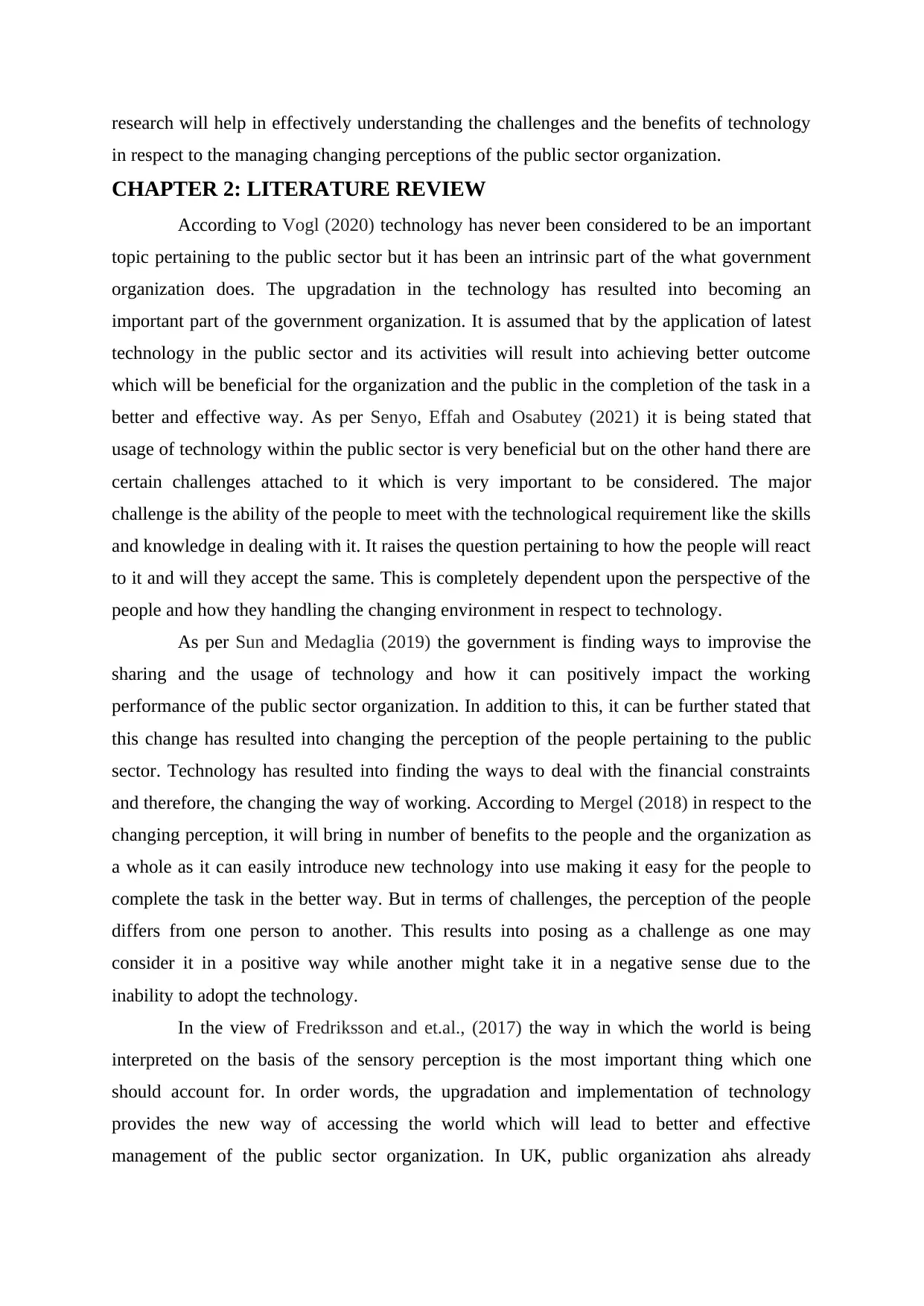
research will help in effectively understanding the challenges and the benefits of technology
in respect to the managing changing perceptions of the public sector organization.
CHAPTER 2: LITERATURE REVIEW
According to Vogl (2020) technology has never been considered to be an important
topic pertaining to the public sector but it has been an intrinsic part of the what government
organization does. The upgradation in the technology has resulted into becoming an
important part of the government organization. It is assumed that by the application of latest
technology in the public sector and its activities will result into achieving better outcome
which will be beneficial for the organization and the public in the completion of the task in a
better and effective way. As per Senyo, Effah and Osabutey (2021) it is being stated that
usage of technology within the public sector is very beneficial but on the other hand there are
certain challenges attached to it which is very important to be considered. The major
challenge is the ability of the people to meet with the technological requirement like the skills
and knowledge in dealing with it. It raises the question pertaining to how the people will react
to it and will they accept the same. This is completely dependent upon the perspective of the
people and how they handling the changing environment in respect to technology.
As per Sun and Medaglia (2019) the government is finding ways to improvise the
sharing and the usage of technology and how it can positively impact the working
performance of the public sector organization. In addition to this, it can be further stated that
this change has resulted into changing the perception of the people pertaining to the public
sector. Technology has resulted into finding the ways to deal with the financial constraints
and therefore, the changing the way of working. According to Mergel (2018) in respect to the
changing perception, it will bring in number of benefits to the people and the organization as
a whole as it can easily introduce new technology into use making it easy for the people to
complete the task in the better way. But in terms of challenges, the perception of the people
differs from one person to another. This results into posing as a challenge as one may
consider it in a positive way while another might take it in a negative sense due to the
inability to adopt the technology.
In the view of Fredriksson and et.al., (2017) the way in which the world is being
interpreted on the basis of the sensory perception is the most important thing which one
should account for. In order words, the upgradation and implementation of technology
provides the new way of accessing the world which will lead to better and effective
management of the public sector organization. In UK, public organization ahs already
in respect to the managing changing perceptions of the public sector organization.
CHAPTER 2: LITERATURE REVIEW
According to Vogl (2020) technology has never been considered to be an important
topic pertaining to the public sector but it has been an intrinsic part of the what government
organization does. The upgradation in the technology has resulted into becoming an
important part of the government organization. It is assumed that by the application of latest
technology in the public sector and its activities will result into achieving better outcome
which will be beneficial for the organization and the public in the completion of the task in a
better and effective way. As per Senyo, Effah and Osabutey (2021) it is being stated that
usage of technology within the public sector is very beneficial but on the other hand there are
certain challenges attached to it which is very important to be considered. The major
challenge is the ability of the people to meet with the technological requirement like the skills
and knowledge in dealing with it. It raises the question pertaining to how the people will react
to it and will they accept the same. This is completely dependent upon the perspective of the
people and how they handling the changing environment in respect to technology.
As per Sun and Medaglia (2019) the government is finding ways to improvise the
sharing and the usage of technology and how it can positively impact the working
performance of the public sector organization. In addition to this, it can be further stated that
this change has resulted into changing the perception of the people pertaining to the public
sector. Technology has resulted into finding the ways to deal with the financial constraints
and therefore, the changing the way of working. According to Mergel (2018) in respect to the
changing perception, it will bring in number of benefits to the people and the organization as
a whole as it can easily introduce new technology into use making it easy for the people to
complete the task in the better way. But in terms of challenges, the perception of the people
differs from one person to another. This results into posing as a challenge as one may
consider it in a positive way while another might take it in a negative sense due to the
inability to adopt the technology.
In the view of Fredriksson and et.al., (2017) the way in which the world is being
interpreted on the basis of the sensory perception is the most important thing which one
should account for. In order words, the upgradation and implementation of technology
provides the new way of accessing the world which will lead to better and effective
management of the public sector organization. In UK, public organization ahs already
Paraphrase This Document
Need a fresh take? Get an instant paraphrase of this document with our AI Paraphraser
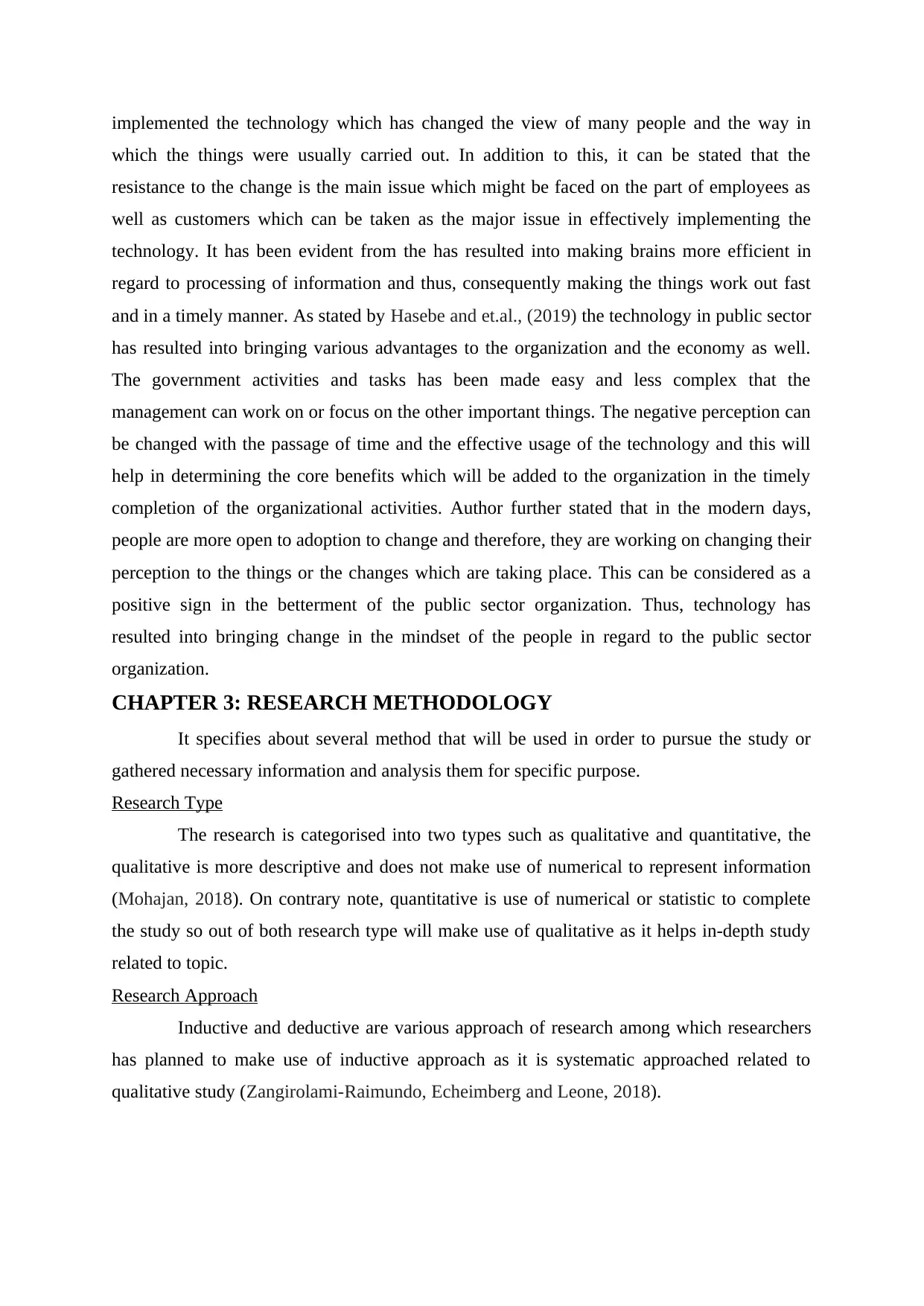
implemented the technology which has changed the view of many people and the way in
which the things were usually carried out. In addition to this, it can be stated that the
resistance to the change is the main issue which might be faced on the part of employees as
well as customers which can be taken as the major issue in effectively implementing the
technology. It has been evident from the has resulted into making brains more efficient in
regard to processing of information and thus, consequently making the things work out fast
and in a timely manner. As stated by Hasebe and et.al., (2019) the technology in public sector
has resulted into bringing various advantages to the organization and the economy as well.
The government activities and tasks has been made easy and less complex that the
management can work on or focus on the other important things. The negative perception can
be changed with the passage of time and the effective usage of the technology and this will
help in determining the core benefits which will be added to the organization in the timely
completion of the organizational activities. Author further stated that in the modern days,
people are more open to adoption to change and therefore, they are working on changing their
perception to the things or the changes which are taking place. This can be considered as a
positive sign in the betterment of the public sector organization. Thus, technology has
resulted into bringing change in the mindset of the people in regard to the public sector
organization.
CHAPTER 3: RESEARCH METHODOLOGY
It specifies about several method that will be used in order to pursue the study or
gathered necessary information and analysis them for specific purpose.
Research Type
The research is categorised into two types such as qualitative and quantitative, the
qualitative is more descriptive and does not make use of numerical to represent information
(Mohajan, 2018). On contrary note, quantitative is use of numerical or statistic to complete
the study so out of both research type will make use of qualitative as it helps in-depth study
related to topic.
Research Approach
Inductive and deductive are various approach of research among which researchers
has planned to make use of inductive approach as it is systematic approached related to
qualitative study (Zangirolami-Raimundo, Echeimberg and Leone, 2018).
which the things were usually carried out. In addition to this, it can be stated that the
resistance to the change is the main issue which might be faced on the part of employees as
well as customers which can be taken as the major issue in effectively implementing the
technology. It has been evident from the has resulted into making brains more efficient in
regard to processing of information and thus, consequently making the things work out fast
and in a timely manner. As stated by Hasebe and et.al., (2019) the technology in public sector
has resulted into bringing various advantages to the organization and the economy as well.
The government activities and tasks has been made easy and less complex that the
management can work on or focus on the other important things. The negative perception can
be changed with the passage of time and the effective usage of the technology and this will
help in determining the core benefits which will be added to the organization in the timely
completion of the organizational activities. Author further stated that in the modern days,
people are more open to adoption to change and therefore, they are working on changing their
perception to the things or the changes which are taking place. This can be considered as a
positive sign in the betterment of the public sector organization. Thus, technology has
resulted into bringing change in the mindset of the people in regard to the public sector
organization.
CHAPTER 3: RESEARCH METHODOLOGY
It specifies about several method that will be used in order to pursue the study or
gathered necessary information and analysis them for specific purpose.
Research Type
The research is categorised into two types such as qualitative and quantitative, the
qualitative is more descriptive and does not make use of numerical to represent information
(Mohajan, 2018). On contrary note, quantitative is use of numerical or statistic to complete
the study so out of both research type will make use of qualitative as it helps in-depth study
related to topic.
Research Approach
Inductive and deductive are various approach of research among which researchers
has planned to make use of inductive approach as it is systematic approached related to
qualitative study (Zangirolami-Raimundo, Echeimberg and Leone, 2018).
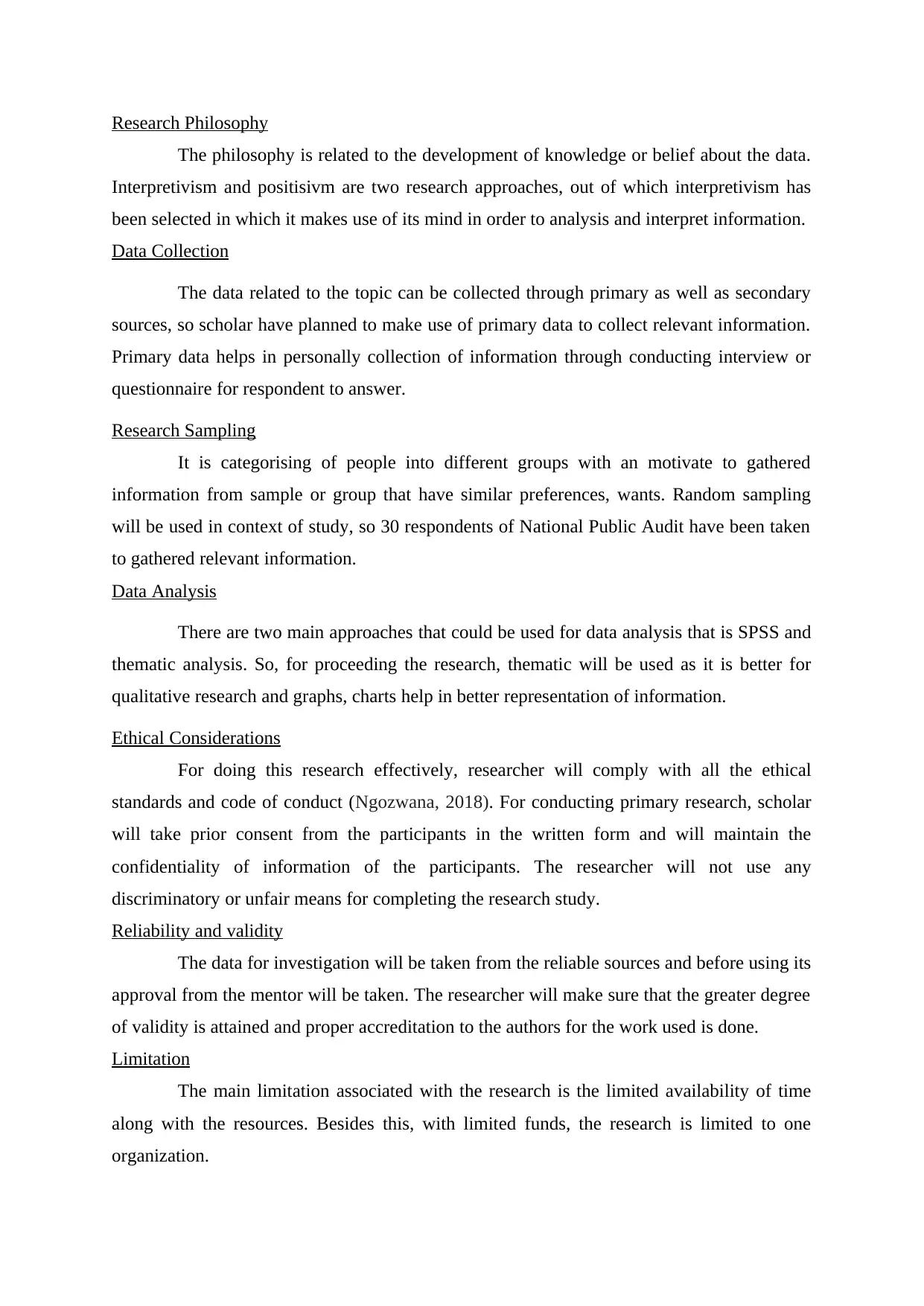
Research Philosophy
The philosophy is related to the development of knowledge or belief about the data.
Interpretivism and positisivm are two research approaches, out of which interpretivism has
been selected in which it makes use of its mind in order to analysis and interpret information.
Data Collection
The data related to the topic can be collected through primary as well as secondary
sources, so scholar have planned to make use of primary data to collect relevant information.
Primary data helps in personally collection of information through conducting interview or
questionnaire for respondent to answer.
Research Sampling
It is categorising of people into different groups with an motivate to gathered
information from sample or group that have similar preferences, wants. Random sampling
will be used in context of study, so 30 respondents of National Public Audit have been taken
to gathered relevant information.
Data Analysis
There are two main approaches that could be used for data analysis that is SPSS and
thematic analysis. So, for proceeding the research, thematic will be used as it is better for
qualitative research and graphs, charts help in better representation of information.
Ethical Considerations
For doing this research effectively, researcher will comply with all the ethical
standards and code of conduct (Ngozwana, 2018). For conducting primary research, scholar
will take prior consent from the participants in the written form and will maintain the
confidentiality of information of the participants. The researcher will not use any
discriminatory or unfair means for completing the research study.
Reliability and validity
The data for investigation will be taken from the reliable sources and before using its
approval from the mentor will be taken. The researcher will make sure that the greater degree
of validity is attained and proper accreditation to the authors for the work used is done.
Limitation
The main limitation associated with the research is the limited availability of time
along with the resources. Besides this, with limited funds, the research is limited to one
organization.
The philosophy is related to the development of knowledge or belief about the data.
Interpretivism and positisivm are two research approaches, out of which interpretivism has
been selected in which it makes use of its mind in order to analysis and interpret information.
Data Collection
The data related to the topic can be collected through primary as well as secondary
sources, so scholar have planned to make use of primary data to collect relevant information.
Primary data helps in personally collection of information through conducting interview or
questionnaire for respondent to answer.
Research Sampling
It is categorising of people into different groups with an motivate to gathered
information from sample or group that have similar preferences, wants. Random sampling
will be used in context of study, so 30 respondents of National Public Audit have been taken
to gathered relevant information.
Data Analysis
There are two main approaches that could be used for data analysis that is SPSS and
thematic analysis. So, for proceeding the research, thematic will be used as it is better for
qualitative research and graphs, charts help in better representation of information.
Ethical Considerations
For doing this research effectively, researcher will comply with all the ethical
standards and code of conduct (Ngozwana, 2018). For conducting primary research, scholar
will take prior consent from the participants in the written form and will maintain the
confidentiality of information of the participants. The researcher will not use any
discriminatory or unfair means for completing the research study.
Reliability and validity
The data for investigation will be taken from the reliable sources and before using its
approval from the mentor will be taken. The researcher will make sure that the greater degree
of validity is attained and proper accreditation to the authors for the work used is done.
Limitation
The main limitation associated with the research is the limited availability of time
along with the resources. Besides this, with limited funds, the research is limited to one
organization.
⊘ This is a preview!⊘
Do you want full access?
Subscribe today to unlock all pages.

Trusted by 1+ million students worldwide
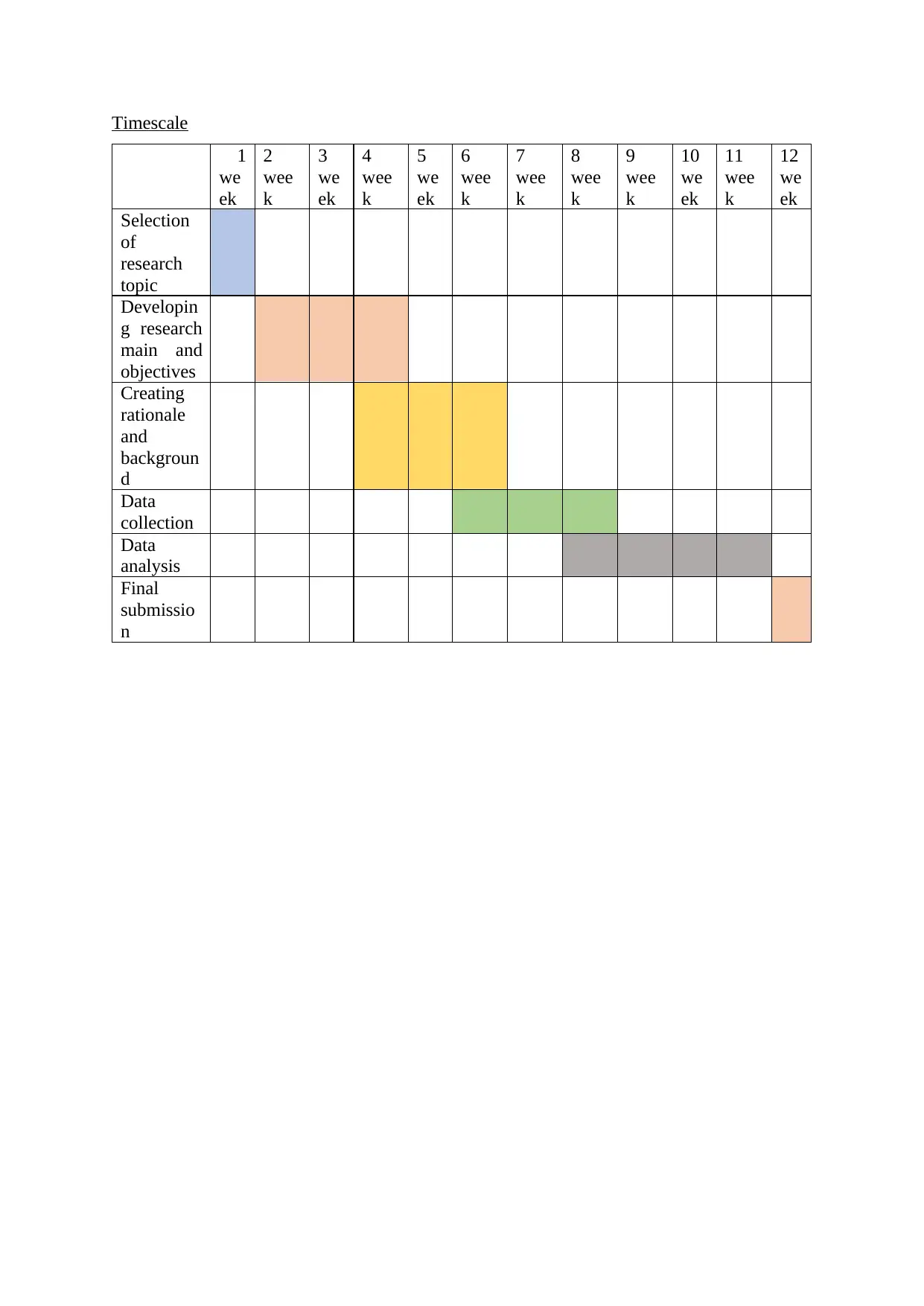
Timescale
1
we
ek
2
wee
k
3
we
ek
4
wee
k
5
we
ek
6
wee
k
7
wee
k
8
wee
k
9
wee
k
10
we
ek
11
wee
k
12
we
ek
Selection
of
research
topic
Developin
g research
main and
objectives
Creating
rationale
and
backgroun
d
Data
collection
Data
analysis
Final
submissio
n
1
we
ek
2
wee
k
3
we
ek
4
wee
k
5
we
ek
6
wee
k
7
wee
k
8
wee
k
9
wee
k
10
we
ek
11
wee
k
12
we
ek
Selection
of
research
topic
Developin
g research
main and
objectives
Creating
rationale
and
backgroun
d
Data
collection
Data
analysis
Final
submissio
n
Paraphrase This Document
Need a fresh take? Get an instant paraphrase of this document with our AI Paraphraser

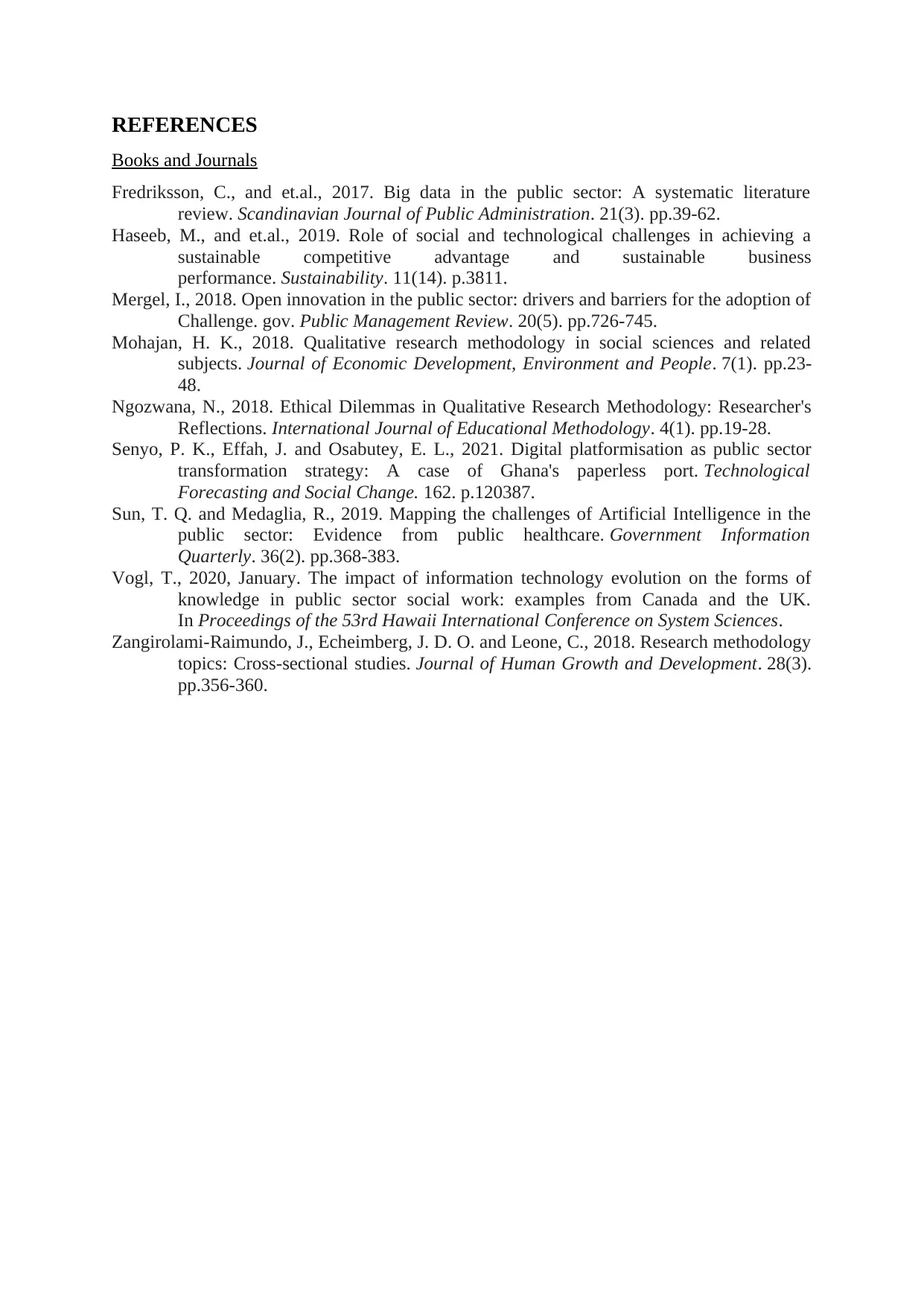
REFERENCES
Books and Journals
Fredriksson, C., and et.al., 2017. Big data in the public sector: A systematic literature
review. Scandinavian Journal of Public Administration. 21(3). pp.39-62.
Haseeb, M., and et.al., 2019. Role of social and technological challenges in achieving a
sustainable competitive advantage and sustainable business
performance. Sustainability. 11(14). p.3811.
Mergel, I., 2018. Open innovation in the public sector: drivers and barriers for the adoption of
Challenge. gov. Public Management Review. 20(5). pp.726-745.
Mohajan, H. K., 2018. Qualitative research methodology in social sciences and related
subjects. Journal of Economic Development, Environment and People. 7(1). pp.23-
48.
Ngozwana, N., 2018. Ethical Dilemmas in Qualitative Research Methodology: Researcher's
Reflections. International Journal of Educational Methodology. 4(1). pp.19-28.
Senyo, P. K., Effah, J. and Osabutey, E. L., 2021. Digital platformisation as public sector
transformation strategy: A case of Ghana's paperless port. Technological
Forecasting and Social Change. 162. p.120387.
Sun, T. Q. and Medaglia, R., 2019. Mapping the challenges of Artificial Intelligence in the
public sector: Evidence from public healthcare. Government Information
Quarterly. 36(2). pp.368-383.
Vogl, T., 2020, January. The impact of information technology evolution on the forms of
knowledge in public sector social work: examples from Canada and the UK.
In Proceedings of the 53rd Hawaii International Conference on System Sciences.
Zangirolami-Raimundo, J., Echeimberg, J. D. O. and Leone, C., 2018. Research methodology
topics: Cross-sectional studies. Journal of Human Growth and Development. 28(3).
pp.356-360.
Books and Journals
Fredriksson, C., and et.al., 2017. Big data in the public sector: A systematic literature
review. Scandinavian Journal of Public Administration. 21(3). pp.39-62.
Haseeb, M., and et.al., 2019. Role of social and technological challenges in achieving a
sustainable competitive advantage and sustainable business
performance. Sustainability. 11(14). p.3811.
Mergel, I., 2018. Open innovation in the public sector: drivers and barriers for the adoption of
Challenge. gov. Public Management Review. 20(5). pp.726-745.
Mohajan, H. K., 2018. Qualitative research methodology in social sciences and related
subjects. Journal of Economic Development, Environment and People. 7(1). pp.23-
48.
Ngozwana, N., 2018. Ethical Dilemmas in Qualitative Research Methodology: Researcher's
Reflections. International Journal of Educational Methodology. 4(1). pp.19-28.
Senyo, P. K., Effah, J. and Osabutey, E. L., 2021. Digital platformisation as public sector
transformation strategy: A case of Ghana's paperless port. Technological
Forecasting and Social Change. 162. p.120387.
Sun, T. Q. and Medaglia, R., 2019. Mapping the challenges of Artificial Intelligence in the
public sector: Evidence from public healthcare. Government Information
Quarterly. 36(2). pp.368-383.
Vogl, T., 2020, January. The impact of information technology evolution on the forms of
knowledge in public sector social work: examples from Canada and the UK.
In Proceedings of the 53rd Hawaii International Conference on System Sciences.
Zangirolami-Raimundo, J., Echeimberg, J. D. O. and Leone, C., 2018. Research methodology
topics: Cross-sectional studies. Journal of Human Growth and Development. 28(3).
pp.356-360.
⊘ This is a preview!⊘
Do you want full access?
Subscribe today to unlock all pages.

Trusted by 1+ million students worldwide
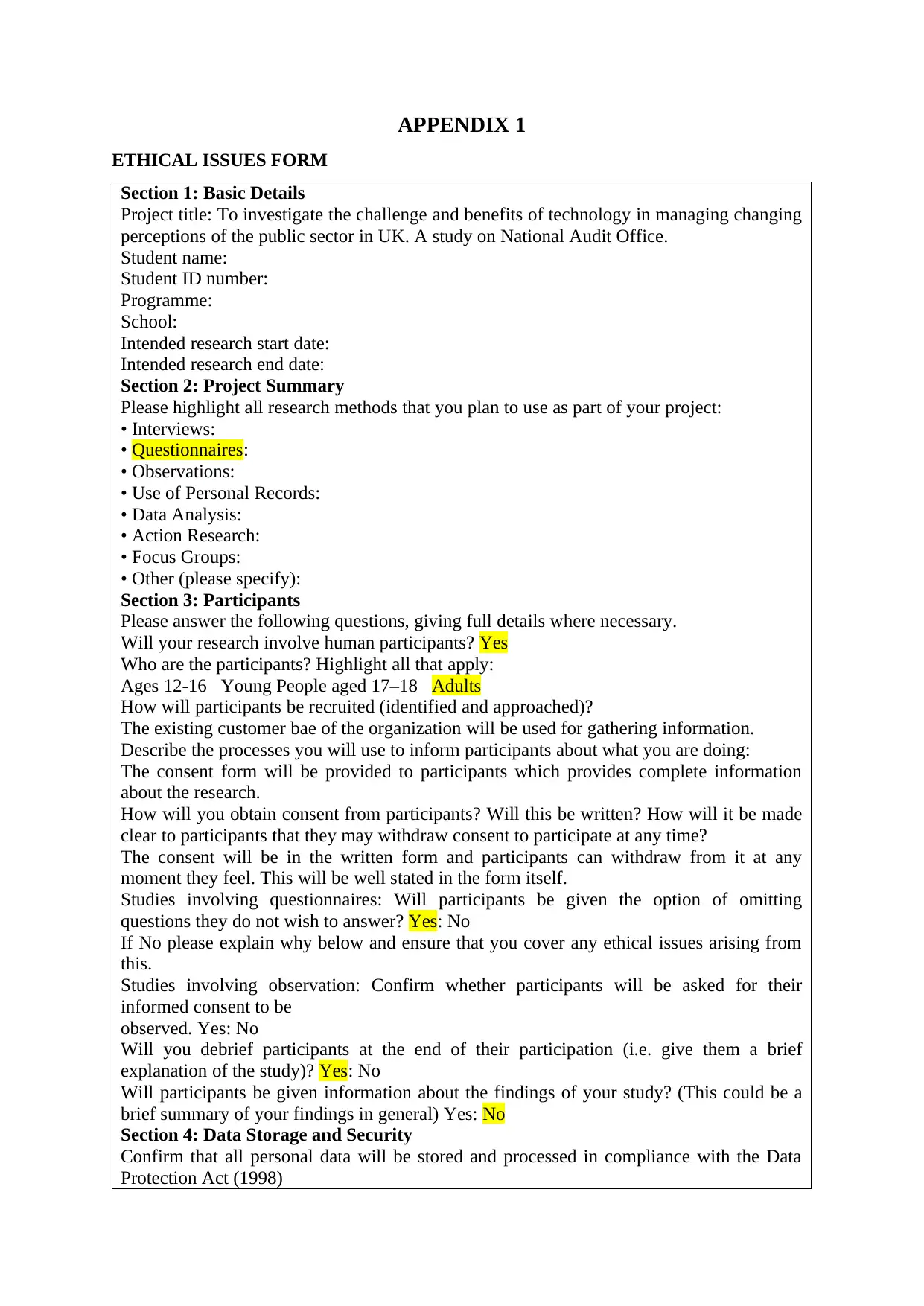
APPENDIX 1
ETHICAL ISSUES FORM
Section 1: Basic Details
Project title: To investigate the challenge and benefits of technology in managing changing
perceptions of the public sector in UK. A study on National Audit Office.
Student name:
Student ID number:
Programme:
School:
Intended research start date:
Intended research end date:
Section 2: Project Summary
Please highlight all research methods that you plan to use as part of your project:
• Interviews:
• Questionnaires:
• Observations:
• Use of Personal Records:
• Data Analysis:
• Action Research:
• Focus Groups:
• Other (please specify):
Section 3: Participants
Please answer the following questions, giving full details where necessary.
Will your research involve human participants? Yes
Who are the participants? Highlight all that apply:
Ages 12-16 Young People aged 17–18 Adults
How will participants be recruited (identified and approached)?
The existing customer bae of the organization will be used for gathering information.
Describe the processes you will use to inform participants about what you are doing:
The consent form will be provided to participants which provides complete information
about the research.
How will you obtain consent from participants? Will this be written? How will it be made
clear to participants that they may withdraw consent to participate at any time?
The consent will be in the written form and participants can withdraw from it at any
moment they feel. This will be well stated in the form itself.
Studies involving questionnaires: Will participants be given the option of omitting
questions they do not wish to answer? Yes: No
If No please explain why below and ensure that you cover any ethical issues arising from
this.
Studies involving observation: Confirm whether participants will be asked for their
informed consent to be
observed. Yes: No
Will you debrief participants at the end of their participation (i.e. give them a brief
explanation of the study)? Yes: No
Will participants be given information about the findings of your study? (This could be a
brief summary of your findings in general) Yes: No
Section 4: Data Storage and Security
Confirm that all personal data will be stored and processed in compliance with the Data
Protection Act (1998)
ETHICAL ISSUES FORM
Section 1: Basic Details
Project title: To investigate the challenge and benefits of technology in managing changing
perceptions of the public sector in UK. A study on National Audit Office.
Student name:
Student ID number:
Programme:
School:
Intended research start date:
Intended research end date:
Section 2: Project Summary
Please highlight all research methods that you plan to use as part of your project:
• Interviews:
• Questionnaires:
• Observations:
• Use of Personal Records:
• Data Analysis:
• Action Research:
• Focus Groups:
• Other (please specify):
Section 3: Participants
Please answer the following questions, giving full details where necessary.
Will your research involve human participants? Yes
Who are the participants? Highlight all that apply:
Ages 12-16 Young People aged 17–18 Adults
How will participants be recruited (identified and approached)?
The existing customer bae of the organization will be used for gathering information.
Describe the processes you will use to inform participants about what you are doing:
The consent form will be provided to participants which provides complete information
about the research.
How will you obtain consent from participants? Will this be written? How will it be made
clear to participants that they may withdraw consent to participate at any time?
The consent will be in the written form and participants can withdraw from it at any
moment they feel. This will be well stated in the form itself.
Studies involving questionnaires: Will participants be given the option of omitting
questions they do not wish to answer? Yes: No
If No please explain why below and ensure that you cover any ethical issues arising from
this.
Studies involving observation: Confirm whether participants will be asked for their
informed consent to be
observed. Yes: No
Will you debrief participants at the end of their participation (i.e. give them a brief
explanation of the study)? Yes: No
Will participants be given information about the findings of your study? (This could be a
brief summary of your findings in general) Yes: No
Section 4: Data Storage and Security
Confirm that all personal data will be stored and processed in compliance with the Data
Protection Act (1998)
Paraphrase This Document
Need a fresh take? Get an instant paraphrase of this document with our AI Paraphraser
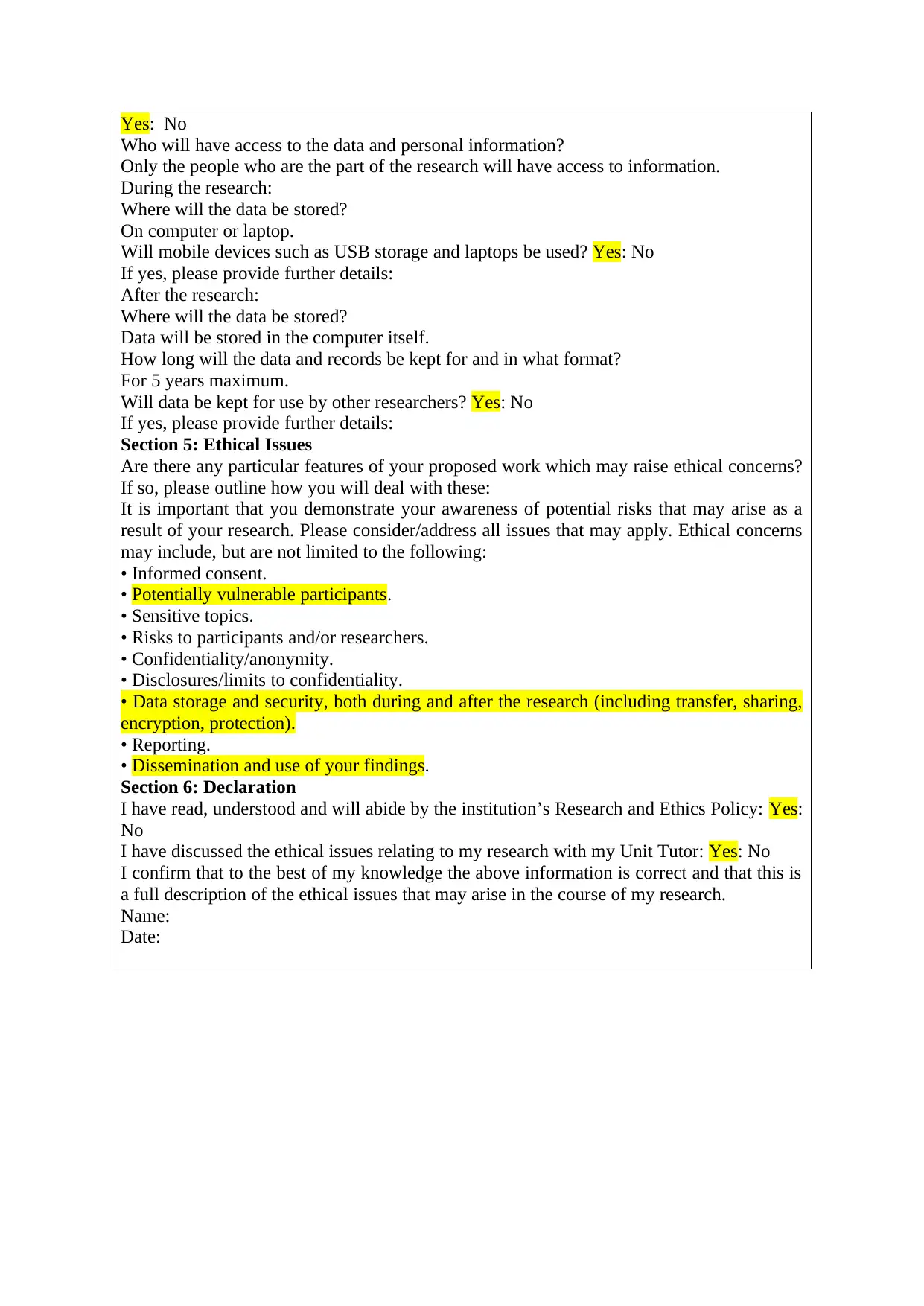
Yes: No
Who will have access to the data and personal information?
Only the people who are the part of the research will have access to information.
During the research:
Where will the data be stored?
On computer or laptop.
Will mobile devices such as USB storage and laptops be used? Yes: No
If yes, please provide further details:
After the research:
Where will the data be stored?
Data will be stored in the computer itself.
How long will the data and records be kept for and in what format?
For 5 years maximum.
Will data be kept for use by other researchers? Yes: No
If yes, please provide further details:
Section 5: Ethical Issues
Are there any particular features of your proposed work which may raise ethical concerns?
If so, please outline how you will deal with these:
It is important that you demonstrate your awareness of potential risks that may arise as a
result of your research. Please consider/address all issues that may apply. Ethical concerns
may include, but are not limited to the following:
• Informed consent.
• Potentially vulnerable participants.
• Sensitive topics.
• Risks to participants and/or researchers.
• Confidentiality/anonymity.
• Disclosures/limits to confidentiality.
• Data storage and security, both during and after the research (including transfer, sharing,
encryption, protection).
• Reporting.
• Dissemination and use of your findings.
Section 6: Declaration
I have read, understood and will abide by the institution’s Research and Ethics Policy: Yes:
No
I have discussed the ethical issues relating to my research with my Unit Tutor: Yes: No
I confirm that to the best of my knowledge the above information is correct and that this is
a full description of the ethical issues that may arise in the course of my research.
Name:
Date:
Who will have access to the data and personal information?
Only the people who are the part of the research will have access to information.
During the research:
Where will the data be stored?
On computer or laptop.
Will mobile devices such as USB storage and laptops be used? Yes: No
If yes, please provide further details:
After the research:
Where will the data be stored?
Data will be stored in the computer itself.
How long will the data and records be kept for and in what format?
For 5 years maximum.
Will data be kept for use by other researchers? Yes: No
If yes, please provide further details:
Section 5: Ethical Issues
Are there any particular features of your proposed work which may raise ethical concerns?
If so, please outline how you will deal with these:
It is important that you demonstrate your awareness of potential risks that may arise as a
result of your research. Please consider/address all issues that may apply. Ethical concerns
may include, but are not limited to the following:
• Informed consent.
• Potentially vulnerable participants.
• Sensitive topics.
• Risks to participants and/or researchers.
• Confidentiality/anonymity.
• Disclosures/limits to confidentiality.
• Data storage and security, both during and after the research (including transfer, sharing,
encryption, protection).
• Reporting.
• Dissemination and use of your findings.
Section 6: Declaration
I have read, understood and will abide by the institution’s Research and Ethics Policy: Yes:
No
I have discussed the ethical issues relating to my research with my Unit Tutor: Yes: No
I confirm that to the best of my knowledge the above information is correct and that this is
a full description of the ethical issues that may arise in the course of my research.
Name:
Date:
1 out of 11
Related Documents
Your All-in-One AI-Powered Toolkit for Academic Success.
+13062052269
info@desklib.com
Available 24*7 on WhatsApp / Email
![[object Object]](/_next/static/media/star-bottom.7253800d.svg)
Unlock your academic potential
Copyright © 2020–2026 A2Z Services. All Rights Reserved. Developed and managed by ZUCOL.





